Your cart is currently empty!

The Unsung Hero of Your Gaming PC: The Power Supply Unit (PSU)
When it comes to building or upgrading a gaming PC, we often focus on graphics cards, CPUs, and fancy RGB lighting. But there’s one crucial component that doesn’t get nearly enough attention: the power supply unit (PSU). This humble piece of hardware is the backbone of your system, ensuring everything runs smoothly and efficiently. Let’s dive into why a quality PSU is essential, how to choose the right one, and whether you can have too much power.
Why the PSU is Crucial for Gaming PCs
Imagine your gaming PC as a high-performance sports car. The PSU is like the engine—it powers everything. Without a reliable engine, your car won’t go far, and the same goes for your gaming rig. Here’s why the PSU is so important:
- Stability and Reliability: A good PSU provides consistent power, preventing random shutdowns or reboots during an intense gaming session.
- Protection: High-quality PSUs come with built-in protection features like overvoltage, undervoltage, and short circuit protection, safeguarding your expensive components.
- Efficiency: Efficient power supplies reduce electricity consumption and heat generation, which can prolong the lifespan of your system components.
Choosing the Right PSU for Your Gaming PC
Selecting the correct PSU isn’t just about picking one with enough wattage. Here are some key factors to consider:
- Wattage: This is the most obvious factor. Use online PSU calculators to estimate your system’s power requirements. As a rule of thumb, it’s wise to have a bit of extra headroom. For most gaming PCs, a 650W to 850W PSU will suffice.
- Efficiency Rating: Look for PSUs with at least an 80 Plus Bronze rating. Higher ratings (Silver, Gold, Platinum, Titanium) indicate better efficiency, which means less wasted power and heat.
- Modularity: Modular PSUs allow you to connect only the cables you need, reducing clutter and improving airflow inside your case. This can be especially important in smaller builds.
- Brand and Warranty: Stick with reputable brands that offer solid warranties. Quality can vary significantly between manufacturers.
Can You Have Too Much Power?
It’s a common misconception that more power is always better. While having a PSU with higher wattage than you need won’t harm your system, it can be a waste of money. Here’s why:
- Cost: Higher wattage PSUs are more expensive. If you buy a 1000W PSU for a system that only needs 500W, you’re spending more than necessary.
- Efficiency: PSUs are most efficient at around 50-70% load. Running a 1000W PSU at 200W load isn’t ideal and can lead to slightly higher electricity bills over time.
So, while it’s crucial not to underpower your system, overspending on an unnecessarily powerful PSU isn’t wise either. Aim for a PSU that meets your needs with a bit of extra headroom for future upgrades.
Lithgow Tech Services: Your Local PSU Experts
If you’re in Lithgow or surrounding areas like Bathurst, Katoomba, or Leura, and need advice on picking the right PSU for your gaming PC, visit us at Lithgow Tech Services, 53 Main Street, Lithgow, NSW. Our team of experts can help you choose the best PSU for your setup and ensure your gaming PC runs flawlessly. You can also check out our online store here for a selection of top-rated PSUs and other components.
References:
Discover more from LithGeek Custom Gaming Computers
Subscribe to get the latest posts sent to your email.
Posted
in
by
Tags:

